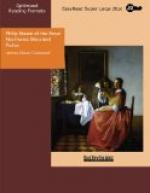It had ceased to occur to him that there was peril in his strange position. If that were so, would his captors have left him in possession of his weapons, even imprisoned as he was? If they had intended him harm, would they have cushioned his box and placed a pillow under his head so that the cloth about his mouth would not cause him discomfort? It struck him as peculiarly significant, now that he had suffered no injury in the short struggle on the trail, that no threats or intimidation had been offered after his capture. This was a part of the game which he was to play! He became more and more certain of it as the minutes passed, and there occurred to him again and again the inspector’s significant words, “Whatever happens!” MacGregor had spoken the words with particular emphasis, had repeated them more than once. Were they intended to give him a warning of this, to put him on his, guard, as well as at his ease?
And with these thoughts, many, conflicting and mystifying, he found it impossible to keep from associating other thoughts of Bucky Nome, and of the woman whom he now frankly confessed to himself that he loved. If conditions had been a little different, if the incidents had not occurred just as they had, he have suspected the hand of Bucky Nome in what was transpiring now. But he discarded that suspicion the instant that it came to him. That which remained with him more and more deeply as the minutes passed was a mental picture of the two women—of this woman who was fighting to save her husband, and of the other, whom he loved, and for whom he had fought to save her for her husband. It was with a dull feeling of pain that he compared the love, the faith, and the honor of this woman whose husband had committed a crime with that one night’s indiscretion of Mrs. Becker. It was in her eyes and face that he had seen a purity like that of an angel, and the pain seemed to stab him deeper when he thought that, after all, it was the criminal’s wife who was proving herself, not Mrs. Becker.
He strove to unburden his mind for a time, and turned his head so that he could peer through the hole in the side of the box. The moon had risen, and now and then he caught flashes of the white snow in the opens, but more frequently only the black shadows of the forest through which they were passing. They had not left Le Pas more than two hours behind when the sledge stopped again and Philip saw a few scattered lights a short distance away.
“Must be Wekusko,” he thought. “Hello, what’s that?”
A voice came sharply from the opposite side of the box.
“Is that you, Fingy?” it demanded. “What the devil have you got there?”
“Your maps and things, sir,” replied Fingy hoarsely. “Couldn’t come up to-morrow, so thought we’d do it to-night.”
Philip heard the closing of a door, and footsteps crunched in the snow close to his ears.
“Love o’ God!” came the voice again. “What’s this you’ve brought them up in, Fingy?”




